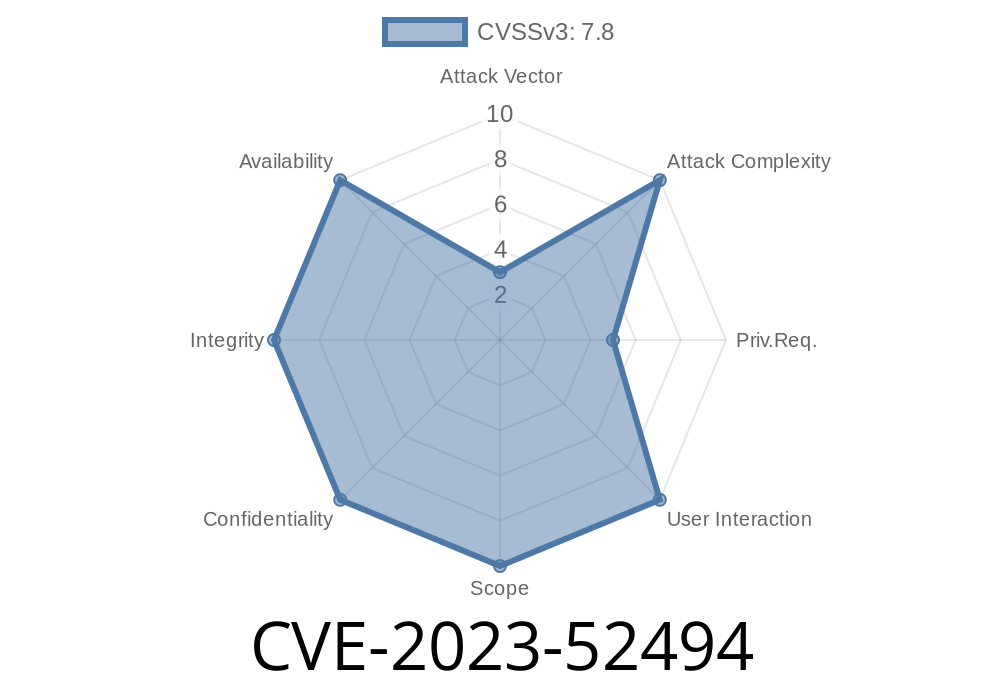In February 2024, a subtle yet potentially serious vulnerability was discovered and addressed in the Linux kernel’s MHI (Modem Host Interface) host driver. Identified as CVE-2023-52494, this bug could allow a local attacker or buggy hardware to trigger denial of service or memory corruption by tampering with buffer pointers. Let’s break down the issue, learn how it can be leveraged, and see how the Linux kernel team addressed it.
The Nature of the Bug
The MHI platform connects modems to hosts in modern devices. The kernel driver uses "event rings" as circular buffers to exchange information. Each entry in the ring must be 128 bits (16 bytes, the size of struct mhi_ring_element) and aligned accordingly.
Previously, the code checked if the event ring “read pointer” was *within* the ring buffer’s address range, but did not confirm alignment. This oversight could allow pointers that were at the wrong offset, such as starting halfway into a 16-byte element.
Original commit discussion:
- kernel.org commit
Memory corruption: Reading past buffer ends or mixing elements.
- Security shells: In rare cases, an attacker might trigger arbitrary write/read outside of buffer.
Here’s a simplified version of the function before the fix
static bool is_valid_ring_ptr(struct mhi_ring *ring, u64 ptr)
{
if (ptr < ring->iommu_base || ptr >= ring->iommu_base + ring->len)
return false;
// MISSING: Alignment check!
return true;
}
What an attacker could do
- Craft or simulate a device that sends a read pointer like ring->iommu_base + 4 (not a multiple of 16).
Exploit attempt (pseudocode)
u64 evil_ptr = ring->iommu_base + 4; // Not 16-byte aligned
if (is_valid_ring_ptr(ring, evil_ptr)) {
// Kernel processes, possibly reading from wrong address!
}
The Patch: Adding Alignment Check
The fix is straightforward: require that the pointer’s address is a multiple of 16.
static bool is_valid_ring_ptr(struct mhi_ring *ring, u64 ptr)
{
if (ptr < ring->iommu_base || ptr >= ring->iommu_base + ring->len)
return false;
// FIX: Only accept 128-bit aligned pointers
if ((ptr & xf) != )
return false;
return true;
}
Reference: Linux Kernel Patch
How Could This Be Exploited?
While remote exploitation is unlikely, anyone with control of MHI hardware or certain VM/hardware fuzzing scenarios could fake pointers, attempt privilege escalation, or reliably crash the system.
If you have privileged access (maybe via ioctl or by spoofing a PCI MHI device)
// Simulate hardware event pushing an unaligned pointer
trigger_event_with_pointer(ring->iommu_base + 8);
After that, depending on hardware and kernel config, you might get
Kernel panic - not syncing: Fatal exception in interrupt
Or corrupted data inside kernel memory regions tied to networking or cellular subsystem.
How to Fix & Mitigation
- Upgrade kernel: Use any kernel version with the alignment patch applied (Linux 6.8+ and many vendor backports).
- Hardening: Use software/hardware that doesn’t allow attackers to pass arbitrary MHI events.
Quick Summary
- CVE-2023-52494 is about alignment. The kernel forgot to check if event ring pointers were exactly 16-byte aligned.
- Without this check, the kernel could misread memory — opening the door to reliability and security bugs.
References
- CVE-2023-52494 at NVD
- Linux Kernel Patch Discussion
- Linux Kernel Commit
Timeline
Published on: 03/11/2024 18:15:17 UTC
Last modified on: 02/14/2025 16:41:13 UTC
